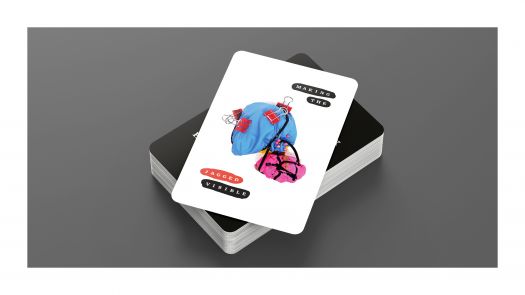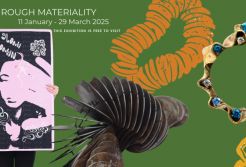Endometriosis project blends healthcare, psychology and design to help communicate pain
28 March 2024
Research leads to first-of-its-kind cards to empower women seeking support
A unique card deck designed by women with endometriosis to help describe their pain to healthcare providers has been produced following a pioneering research project combining psychology, art and design.
The Making Endometriosis Visible cards are designed to be used in healthcare settings by women with the condition to help them express their experience of pain, and were produced following a series of workshops and research studies.
A debilitating gynaecological condition that causes painful periods, chronic pelvic pain, fatigue and poor mental health, endometriosis affects one in ten women in the UK, yet figures revealed this month show it takes an average of eight years and ten months to get a diagnosis.
A recent study from Manchester Met showed that women with the condition are being failed and feel dismissed, a problem it is hoped the card deck will address by encouraging better understanding and communication between patients and healthcare providers, as well as friends and family.
Involving workshops with Manchester-based women who have experience of endometriosis and an average diagnosis delay of ten years, Making Endometriosis Visible is a new and innovative approach to understanding the condition by combining psychology, art and design.

Led by Manchester Met’s Department of Psychology and Manchester School of Art alongside artist Helen Mather, arts and mental health charity the Arc Centre and charity Endometriosis UK, the groups saw the women working through participatory workshop methods to create artefacts that represent their own experience of endometriosis pain.
The women’s verbal descriptions of their pain were recorded by the researchers and their artefacts were photographed, with recent Manchester Met BA (Hons) Graphic Design graduate Lisa da Silva designing the cards, which were then printed into handy decks.
Discussions are now underway with NHS healthcare professionals and other women with endometriosis to explore how the cards may be used to aid conversations in clinical and community health settings, including GP visits and therapeutic support sessions.
A new exhibition, Making Endometriosis Visible, will present an overview of the work undertaken including photography and film, at the Arc Centre (based at the Hat Museum, Stockport), from 30 March to 11 May.
Dr Jasmine Hearn, Senior Lecturer in Psychology, said: “We know from our research that it’s difficult to find the right words to talk about endometriosis pain and help other people understand what’s going on inside the bodies of the women affected.
“We’re hoping that by creating tangible visualisations of their pain printed on handy cards, we’ll be helping people to empathise with women’s experiences and facilitate more supportive conversations about endometriosis and its considerable impact on quality of life.”

Project participant Janie Lucchese, who was diagnosed in 2018 following years of symptoms, and who still lives with chronic pain, said: “I liked the fact the workshops were so practical and tangible. Handling the materials enabled me to communicate how I feel in myself. We can now use what we created as an effective tool to aid conversation and to show someone how we’re feeling using a different kind of language.
“A lot of doctors use a pain scale of zero to ten, but that doesn’t really cut it when you’re trying to explain the exact sensations you’re experiencing. I feel honoured to be part of this project helping more women to communicate effectively, and more practitioners to understand them a little bit more.”
Launching during Endometriosis Awareness Month (March) and running until 11 May, the Making Endometriosis Visible exhibition at the Arc Centre (based at the Hat Museum, Stockport) is open to the public. It will include background about the project development process including images and a specially commissioned film documenting the workshops facilitated by artist Helen Mather, how the cards were created by the team of academics, project participants and Manchester Met BA (Hons) Graphic Design graduate Lisa da Silva, and information about endometriosis.
For more information about the exhibition go to: www.makingendometriosisvisible.org/exhibition



